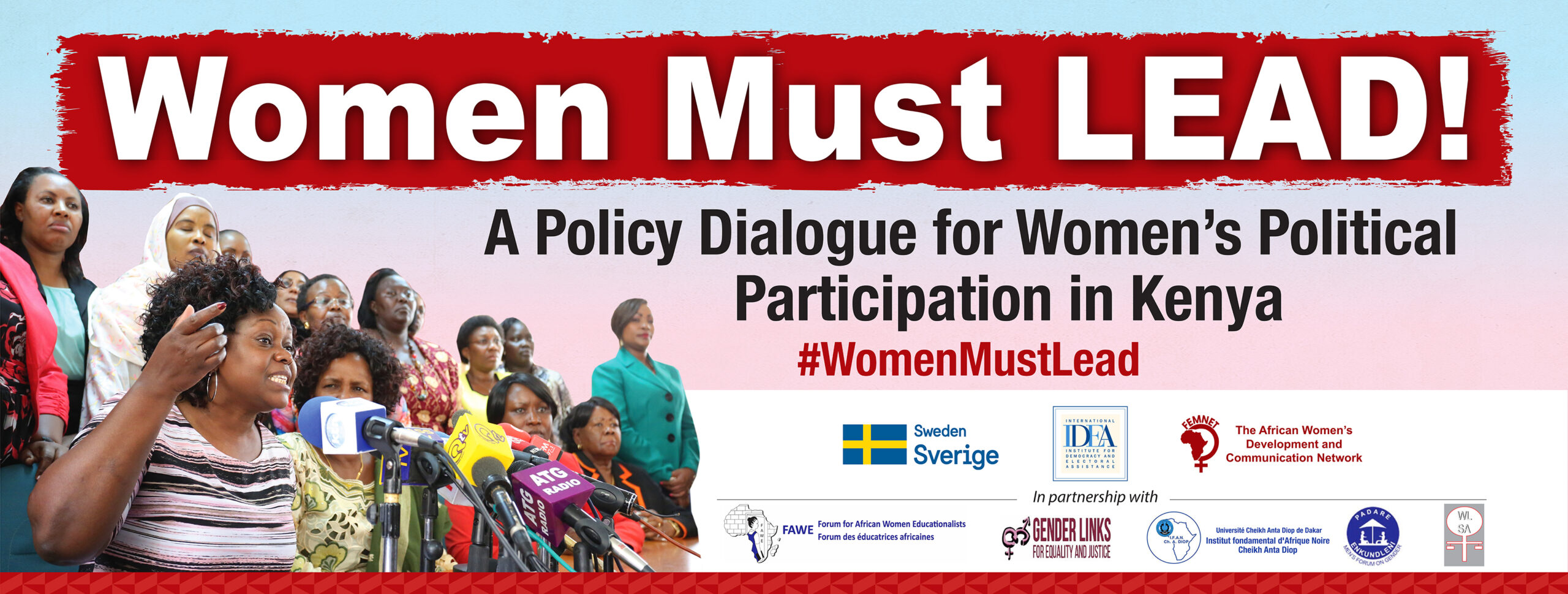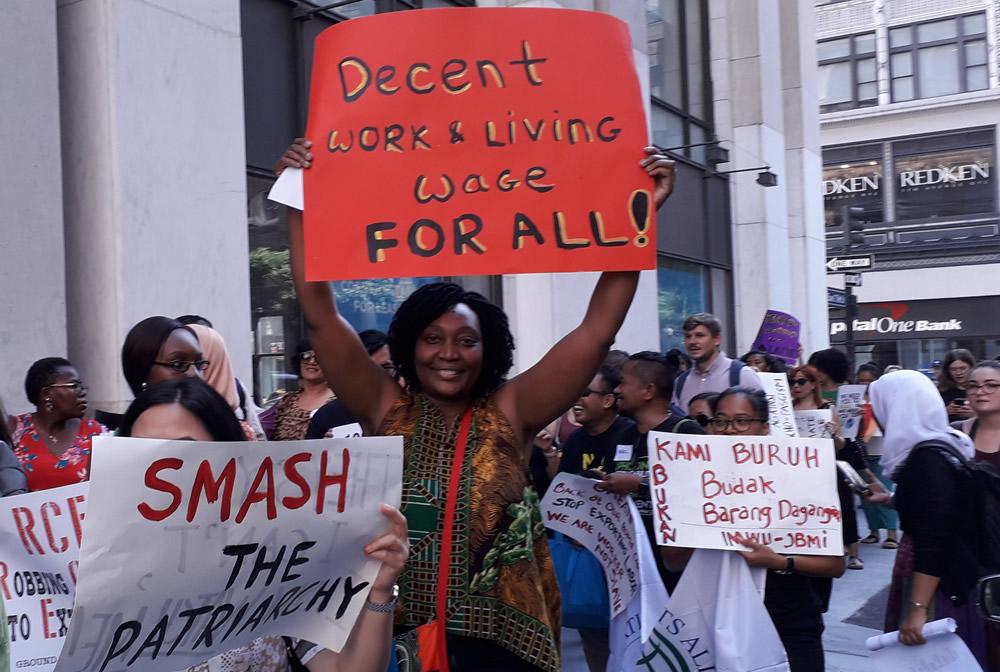Press Release: Interrogating Gender & Elections and Envisioning Women’s Leadership Post 2015
PRESS RELEASE
For Immediate Release: 26th November 2012
Lilongwe, Malawi – Her Excellency Joyce Banda, President of the Republic of Malawi officially presided over the Fourth Regional Conference for African Women in Political Leadership taking place in Lilongwe, Malawi from November 26th to 28th 2012. “A second female head of state, along with the first female chairperson of the African Union Commission suggests that we are seeing a trend, that these triumphs are perhaps the first fruits of a broader transformation. It is far from the end of our struggle, but it is powerfully symbolic of the possibilities attainable by women in our countries, on this continent and around the world. Women working together, persistently against all odds.” remarked Her Excellency during the opening session. “As we remember and pay tribute to those visionaries, both men and women who fought for those victories, we have come together today to work out and imagine an even better future which both our ancestors and descendants alike can be proud of” she continued.
For Immediate Release: 26th November 2012
Lilongwe, Malawi – Her Excellency Joyce Banda, President of the Republic of Malawi officially presided over the Fourth Regional Conference for African Women in Political Leadership taking place in Lilongwe, Malawi from November 26th to 28th 2012. “A second female head of state, along with the first female chairperson of the African Union Commission suggests that we are seeing a trend, that these triumphs are perhaps the first fruits of a broader transformation. It is far from the end of our struggle, but it is powerfully symbolic of the possibilities attainable by women in our countries, on this continent and around the world. Women working together, persistently against all odds.” remarked Her Excellency during the opening session. “As we remember and pay tribute to those visionaries, both men and women who fought for those victories, we have come together today to work out and imagine an even better future which both our ancestors and descendants alike can be proud of” she continued.
HE Joyce Banda also launched Herstory: Our Journey in Advocating for the Rights of African Women which documents the African Women’s Development and Communication Network (FEMNET)’s inspiring story which traces the women pioneers who gave birth to it and nurtured it to present day. It captures the source of knowledge of some women pioneers and the journey they have traversed nationally, regionally and globally in building a strong and vibrant women’s movement in Africa.
The conference has been organized by FEMNET in collaboration with Malawi NGO Gender Coordinating Network and in partnership with United Nations Development Programme (UNDP).
The Annual Regional Conference is a platform for African women in political leadership to meet, interact, share experiences and collectively devise ways to overcome the persistent challenges that hinder women’s equal and effective participation in decision making processes. The conferences have been held in Togo (2009), Zambia (2010) and Kenya (2011). The theme of the current conference is Interrogating Gender & Elections and Envisioning Women’s Leadership Post 2015.
Participants of the Conference include seasoned women politicians, members of parliament, political aspirants leading women’s rights activists from countries holding elections in 2012-2015, civil society and research organisations engaged in women’s leadership development, and key development partners who support women’s political participation initiatives from across the African continent including: Botswana, Burkina Faso, Egypt, Ethiopia, Kenya, Malawi, Mali, Mauritius, Nigeria, Rwanda, Swaziland, Togo, and Tunisia.
For more Information, and to get a copy of Herstory please contact:
Nebila Abdulmelik +265882400946/+254752766932 communication@femnet.or.ke
Notes:
African women currently occupy 20.3% of parliamentary seats in Sub-Saharan Africa. The world average is 20.2% with Nordic countries leading the way at 42%.[1] The proportion of African women in parliament continues to rise in tandem with the average across all regions. In a span of 15 years the proportion of women in parliament world-wide and in Sub-Saharan Africa has almost doubled, compared to the 11% reported in 1997.[2]
Several significant gains have been made for women in political leadership. Africa embraced its second female president when President Joyce Banda assumed power in Malawi in April 2012. The African Union Commission also elected its first female Chairperson, Dr. Nkosazana Dlamini Zuma, during the 19thOrdinary Session of the African Union Assembly in July 2012. Senegal and Algeria joined the ranks of a select few African states when their elections yielded 42.7% and 31.6% women in parliament respectively. Algeria saw an incredible four-fold increase from the previous parliament which had only 7.7% women’s representation, and Senegal became the first West African nation to cross the 30% threshold. Currently, 9 African countries meet the 30% United Nations threshold for women’s representation: Rwanda (56.3%), Seychelles (43.8%), Senegal, South Africa (42.3%), Mozambique (39.2), Tanzania (36%), Uganda (35%), Algeria, and Burundi (30.5%). Rwanda remains the only nation to have achieved gender parity.
The conference has been organized by FEMNET in collaboration with Malawi NGO Gender Coordinating Network and in partnership with United Nations Development Programme (UNDP).
The Annual Regional Conference is a platform for African women in political leadership to meet, interact, share experiences and collectively devise ways to overcome the persistent challenges that hinder women’s equal and effective participation in decision making processes. The conferences have been held in Togo (2009), Zambia (2010) and Kenya (2011). The theme of the current conference is Interrogating Gender & Elections and Envisioning Women’s Leadership Post 2015.
Participants of the Conference include seasoned women politicians, members of parliament, political aspirants leading women’s rights activists from countries holding elections in 2012-2015, civil society and research organisations engaged in women’s leadership development, and key development partners who support women’s political participation initiatives from across the African continent including: Botswana, Burkina Faso, Egypt, Ethiopia, Kenya, Malawi, Mali, Mauritius, Nigeria, Rwanda, Swaziland, Togo, and Tunisia.
For more Information, and to get a copy of Herstory please contact:
Nebila Abdulmelik +265882400946/+254752766932 communication@femnet.or.ke
Notes:
African women currently occupy 20.3% of parliamentary seats in Sub-Saharan Africa. The world average is 20.2% with Nordic countries leading the way at 42%.[1] The proportion of African women in parliament continues to rise in tandem with the average across all regions. In a span of 15 years the proportion of women in parliament world-wide and in Sub-Saharan Africa has almost doubled, compared to the 11% reported in 1997.[2]
Several significant gains have been made for women in political leadership. Africa embraced its second female president when President Joyce Banda assumed power in Malawi in April 2012. The African Union Commission also elected its first female Chairperson, Dr. Nkosazana Dlamini Zuma, during the 19thOrdinary Session of the African Union Assembly in July 2012. Senegal and Algeria joined the ranks of a select few African states when their elections yielded 42.7% and 31.6% women in parliament respectively. Algeria saw an incredible four-fold increase from the previous parliament which had only 7.7% women’s representation, and Senegal became the first West African nation to cross the 30% threshold. Currently, 9 African countries meet the 30% United Nations threshold for women’s representation: Rwanda (56.3%), Seychelles (43.8%), Senegal, South Africa (42.3%), Mozambique (39.2), Tanzania (36%), Uganda (35%), Algeria, and Burundi (30.5%). Rwanda remains the only nation to have achieved gender parity.
[1] Women in National Parliaments, Situation as of 30 September 2012, http://www.ipu.org/wmn-e/world.htm
[2] Women in National Parliaments, Situation as of 25 December 1997, http://www.ipu.org/wmn-e/arc/world251297.htm
[download id=”2291″]
[download id=”2291″]
Related Tags
Related Posts
“Women Must LEAD! We need feminist leadership in Kenya”
Press Statement For Immediate Release: Nairobi, 29th August 2020 Ten years after the promulgation of the Constitution of
Learn MoreFEMNET urges more commitment to the delivery of the 2030 Agenda for Sustainable Development
New York, 19th July 2019 – The African Women’s Development and Communication Network, FEMNET alongside hundreds of women’s
Learn More

